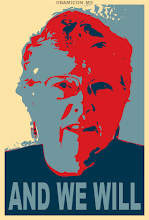Dems woo Native American vote - Carrie Budoff Brown
THORNTON, Colo. — Sen. Barack Obama has done it in city after city, privately and quietly. Before or after his appearances in front of crowds of thousands, he retreats to a holding room with a dozen or more Native American tribal leaders.
The rarely publicized meetings are one piece of what Indian Country leaders describe as an unprecedented effort this year by the presidential field to pay heed to this small and historically overlooked voting bloc. In the past two weeks alone, Obama, Sen. Hillary Rodham Clinton and her husband, former President Bill Clinton, campaigned on Indian reservations across South Dakota and Montana as Sen. John McCain met with tribal leaders in New Mexico.
Making up less than 2 percent of the U.S. population and concentrated mostly outside key primary states in past election years, Native Americans are seeing an uptick in prominence because of political and geographic realities.
The prolonged primary season has pushed the contest into states with larger Native communities — states that typically voted too late to attract much attention from presidential candidates. With the emergence of the Mountain West as the newest general election battleground, the Native vote is more highly sought after than ever since it has proven to be mobilized and instrumental in recent statewide races.
“This has never, ever happened before,” said Jacqueline Johnson, executive director of the National Congress of American Indians, which is neutral in the race. “In 2004, we thought it was a landmark when we got a majority of the candidates to make a statement to Indian Country and come to our conference.”
Native Americans traditionally and overwhelmingly vote Democratic, but leaders said they expect some in their community to at least consider McCain because of his history working on their issues as a past chairman of the Senate Indian Affairs Committee.
Clinton, too, has a track record as first lady and as a New York senator, which both she and her husband emphasized on separate tours through reservations in the run-up to Tuesday’s last-in-the nation primaries in South Dakota and Montana.
“I will be your champion,” Clinton told a crowd on the Pine Ridge Indian Reservation in Kyle, S.D. “I will fight for you. I will stand up for you, and I will work my heart out for you.”
Yet it’s the level of engagement from Obama — a senator from a state with no federally recognized tribes, a city guy with a limited legislative record on Native issues — that has surprised some in the community.
“Obama we weren’t so sure about,” Johnson said.
But from the start, Obama built an inner circle of advisers that included one of the community’s most revered advocates, former Senate Majority Leader Tom Daschle of South Dakota. The Illinois senator hired former Daschle operatives with connections to Indian Country and an understanding of its power to swing elections.
Native Americans have built clout in recent years, playing a key role in an Arizona congressional race and assisting in the 2002 victory of Sen. Tim Johnson (D-S.D.) by 524 votes. Controversial late returns from Shannon County, which includes the Pine Ridge Sioux Indian Reservation, put Johnson ahead of Republican challenger John Thune. In 2004, Shannon County delivered 85 percent of the vote to Democratic presidential nominee John Kerry, making it his top county in the nation. The Native American vote was also considered key in Montana’s 2006 Senate race when Democrat Jon Tester defeated Republican incumbent Conrad Burns.
“I would like to believe these efforts reaching into Indian Country are truly altruistic — and for the large part, they are — but these candidates know that in order to win, Indian Country can be a deciding factor,” said Kalyn Free, an Oklahoma superdelegate and founder of the Indigenous Democratic Network’s List, a political organization that mobilizes the Indian vote and recruits, trains and funds Native American candidates.


Links to this post:
Create a Link
<< Home